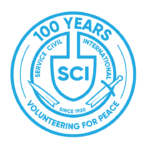by Monica Kampfer
Attending a work camp near Ulaanbaatar gave Monica Kampfer a chance to help Mongolia’s orphans and experience the nomadic lifestyle.
After spending a day sightseeing in Ulaanbaatar, Mongolia’s polluted and overcrowded capital, it was a relief to arrive at the camp. The campsite at Buhug was in a very remote and beautiful location, surrounded by green hills and blue sky.
The children gave us a warm welcome and the more outgoing ones wanted to talk to us straight away. They were from the government-run orphanage. During the summer the orphans stay in two summer camps. This one is a vegetable farm and houses 150 children aged from eight to 18. It grows food for the kids to eat in the winter.
Our accommodation was in a Ger (a traditional Mongolian tent). On the first night the roof blew off and we all got wet. As it rained nearly every night, we quickly learned how to tie the ropes down properly to keep dry.
After seeing what the locals ate, and how they cooked it, I’m glad we did our own cooking. The most common Mongolian dishes are buuz (steamed mutton dumplings) guriltai sho (mutton/beef noodle soup) and khuushuur (a type of pancake filled with meat).
There weren’t a lot of vegetables and the children loved to have some fresh watermelon. They also drink a lot of tea, which is always salty. Often there wasn’t enough food for the orphans and sometimes I had the feeling they filled their hungry stomachs with milky tea.
A group of teenage children (17 girls and 12 boys) helped us with our work. They were very well educated and eager to practice their English. Our main job was weeding the vegetable patches. We also built a shower for the volunteers, dug a garbage tip and built a compost heap.
There were no tools to use, not even a wheelbarrow, which made working very complicated. Our camp coordinator, Enkh Baatar, told us to bring a small shovel, as you can’t even buy one in Ulaanbaatar. We only had eight shovels to share between 40 workers.
It’s very difficult for the Mongolians to change their nomadic traditions and embrace farming. Also, the climate and land are not ideal for agriculture. As an organic farmer I saw many things that could be done better, easier and more successfully. If only…
Baatar told me, “They are all well educated – they just need somebody to tell them what to do.” Mongolians have to find a solution to survive in future. The work camps are a good way to bring ideas and support them to do so.
On the weekend we went to Arvaikheer Aimag (1913m elevation) to see Erdene Zuu Khiid, the first Buddhist monastery in Mongolia, built around 1586. We drove eight hours on bad roads and stayed overnight with nomads near Khan Bayan.
The nomads offered us salty tea, and later they fed us guriltai shol (muton noodle soup). We were a little bit uncomfortable because we weren’t sure of the local customs. You take your shoes off and step into the left side of the Ger and women sit down straight away. Other customs include holding cups with both hands and never refusing food or airag, which is slightly alcoholic fermented mare’s milk.
So we tried to be polite and eat of all the traditional food they gave us, such as tarag (yoghurt) and aarts (a very smelly sour cottage cheese). Unfortunately we couldn’t stomach aaruul (a hard cheese). We all went to sleep to the loud music from their black and white TV, which they watched with their neighbours until the early morning.
The next morning we drove another two hours to the monastery. It was very touristy, but we could still imagine what it would be like living here in the past. There was a lot of gold decoration to admire and interesting stories to hear.
On the last Sunday Baatar took us to meet the younger orphans at Khangait. Their summer camp was in a beautiful valley full of pine trees and the sky was as blue as a lake. But it was heartbreaking to see so many little children grabbing at us, just to hold our hands. They had nice clothes on and looked quite happy, but we could see they would love to have somebody to play with or talk to, or just sit down and hold them in their lap.
Back in Ulaanbaatar the volunteers met for a final meal. The other volunteers were from Germany, Norway, USA, Italy, Turkey, France and England. The group was very enthusiastic and hard working. Everybody worked really hard to accept each other.
I had a great time. The smiling nomads, so friendly, simple and full of surprises, will stay in my memory. Mongolia a very special country and I will go back there.

